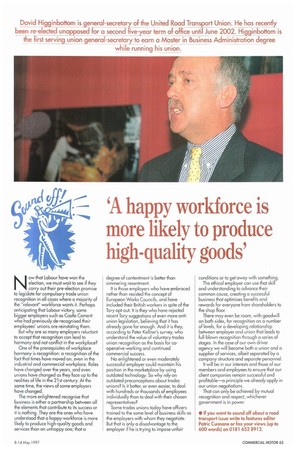'A happy workforce is more likely to produce high-quality goods'
Page 67

If you've noticed an error in this article please click here to report it so we can fix it.
David Higginbottonn is general-secretary of the United Road Transport Union. He has recently been re-elected unopposed for a second five-year term of office until June 2002. Higginbottom is the first serving union general-secretary to earn a Master in Business Administration degree while running his union.
Now that Labour have won the election, we must wait to see if they carry out their pre-election promise to legislate For compulsory trade union recognition in all cases where a majority of the "relevant" workforce wants it. Perhaps anticipating that Labour victory, some bigger employers such as Castle Cement who had previously de-recognised their employees' unions are reinstating them.
But why are so many employers reluctant to accept that recognition can lead to harmony and not conflict in the workplace? One of the prerequisites of workplace harmony is recognition: a recognition of the fact that times have moved on, even in the industrial and commercial workplace. Roles have changed over the years, and even unions have changed as they face up to the realities of life in the 21st century. At the same time, the views of some employers have changed. The more enlightened recognise that business is either a partnership between all the elements that contribute to its success or it is nothing. They are the ones who have understood that a happy workforce is more likely to produce high-quality goods and services than an unhappy one; that a degree of contentment is better than simmering resentment. It is those employers who have embraced rather than resisted the concept of European Works Councils, and have included their British workers in spite of the Tory opt-out. It is they who have rejected recent Tory suggestions of even more antiunion legislation, believing that it has already gone for enough. And it is they, according to Peter Kellner's survey, who understand the value of voluntary trades union recognition as the basis for cooperative working and continued commercial success.
No enlightened or even moderately successful employer could maintain his position in the marketplace by using outdated technology. So why rely on outdated preconceptions about trades unions? Is it better, or even easier, to deal with hundreds or thousands of employees individually than to deal with their chosen representatives? Some trades unions today have officers trained to the same level of business skills as the employers with whom they negotiate. But that is only a disadvantage to the employer if he is trying to impose unfair conditions or to get away with something. The ethical employer can use that skill and understanding to advance their common cause, creating a successful business that optimises benefits and rewards for everyone from shareholders to the shop floor. There may even be room, with goodwill on both sides, for recognition on a number of Levels, for a developing relationship between employer and union that leads to full-blown recognition through a series of stages. In the case of our own driver agency we will become both a union and a supplier of services, albeit separated by a company structure and separate personnel. It will be in our interests and those of our members and employees to ensure that our client companies remain successful and profitable—a principle we already apply in our union negotiations. That can only be achieved by mutual recognition and respect, whichever government is in power.
• If you want to sound off about a road transport issue write to features editor Patric Cunnane or fax your views (up to 600 words) on 0181 652 8912.




























































































































